Homeless Female Veterans
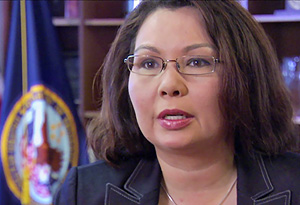
They're 7,000 miles away from home, living in barracks in the desert and fighting terrorists to protect America's freedom. On top of dodging bullets and bombs, many female soldiers spend their days worrying about the civilian lives they left behind. Their children, bills, jobs and day-to-day responsibilities weigh heavily on their hearts.
Many female veterans find themselves facing harsh realities like homelessness when they return home. Experts believe there are at least 6,500 female veterans sleeping in cars, shelters or on the streets every night.
"The number of female veterans has doubled in the last decade," says Tammy Duckworth, assistant secretary for public and intergovernmental affairs in the United States Department of Veterans Affairs. In fact, she says female soldiers are two times more likely to become homeless than male veterans.
More facts on homeless veterans
"We really see the problem of homelessness among veterans as a national shame," Tammy says. "We are all dishonored anytime a veteran sleeps on the very same streets that he or she has defended."
Many female veterans find themselves facing harsh realities like homelessness when they return home. Experts believe there are at least 6,500 female veterans sleeping in cars, shelters or on the streets every night.
"The number of female veterans has doubled in the last decade," says Tammy Duckworth, assistant secretary for public and intergovernmental affairs in the United States Department of Veterans Affairs. In fact, she says female soldiers are two times more likely to become homeless than male veterans.
More facts on homeless veterans
"We really see the problem of homelessness among veterans as a national shame," Tammy says. "We are all dishonored anytime a veteran sleeps on the very same streets that he or she has defended."
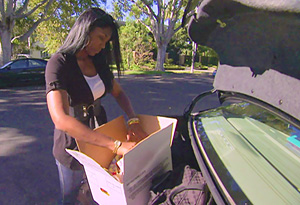
She survived the September 11 attack at the Pentagon and put her life on the line in Iraq and Afghanistan. Now, Alicia, a retired Air Force staff sergeant, is living out of her car. She says she's been homeless for about a year.
Every month, Alicia is paid $700 for her 10 years of service, but because of debts that are withdrawn from her payment, she says she only gets about $200. On a day-to-day basis, Alicia lives on about $13, and for the past six weeks, most of that money has gone toward a car, which she rents for $10 a day.
At night, Alicia sleeps in this car...if she sleeps at all. "I have slept in the most dangerous of places with attacks and everything else," she says. "So it's very easy for me to sleep any kind of way." There are times, however, when Alicia says she doesn't sleep for days.
See what a typical day is like for Alicia.
Years of military training helps Alicia survive on a limited food supply. "I probably eat off of $1 a day," she says. "My stomach really is geared toward battle." She calls a box that she keeps in the trunk of her rental car her "kitchen," and she stocks this box with food she can heat up easily. "Microwaves are very easily accessible all times of night," she says. "So a lot of my food is microwaveable."
To shower and freshen up, Alicia goes to a local gym. "This is where I can take a shower, do my hair, put on my makeup," she says. Then, it's off to a cell phone waiting lot at a nearby airport. "I come here because it's close to a lot of hotels," she says. "If I need to go to the restroom, I can go in there."
Alicia may seem strong, but during quiet moments in her car, it's obvious that her spirit is broken. "The word I have trouble saying is the fact that I'm...homeless," she says. "The moment I turn the key, and I take those blankets out of the trunk, it hits me."
Every month, Alicia is paid $700 for her 10 years of service, but because of debts that are withdrawn from her payment, she says she only gets about $200. On a day-to-day basis, Alicia lives on about $13, and for the past six weeks, most of that money has gone toward a car, which she rents for $10 a day.
At night, Alicia sleeps in this car...if she sleeps at all. "I have slept in the most dangerous of places with attacks and everything else," she says. "So it's very easy for me to sleep any kind of way." There are times, however, when Alicia says she doesn't sleep for days.
See what a typical day is like for Alicia.
Years of military training helps Alicia survive on a limited food supply. "I probably eat off of $1 a day," she says. "My stomach really is geared toward battle." She calls a box that she keeps in the trunk of her rental car her "kitchen," and she stocks this box with food she can heat up easily. "Microwaves are very easily accessible all times of night," she says. "So a lot of my food is microwaveable."
To shower and freshen up, Alicia goes to a local gym. "This is where I can take a shower, do my hair, put on my makeup," she says. Then, it's off to a cell phone waiting lot at a nearby airport. "I come here because it's close to a lot of hotels," she says. "If I need to go to the restroom, I can go in there."
Alicia may seem strong, but during quiet moments in her car, it's obvious that her spirit is broken. "The word I have trouble saying is the fact that I'm...homeless," she says. "The moment I turn the key, and I take those blankets out of the trunk, it hits me."
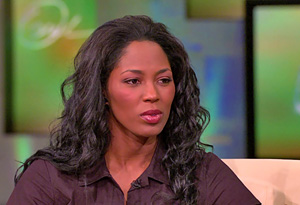
People may wonder why Alicia doesn't ask for help, but she says she feels like she can't. "It's hard to say you're drowning when your mouth is full of water," she says.
Despite the obstacles Alicia faces on a daily basis, she says she's not angry that she's homeless."I grew up in Washington, D.C., around some of the greatest leaders of all time," Alicia says. "[I was] influenced by their strength and what they did in the heat of battle."
Alicia says she is angry that male veterans seem to have more resources available to them than female soldiers. "There's only one woman's program," she says. "There's only 30-some beds. When they fill up, where are we going? Yet men, of course, they dominate the military. They also dominate the housing situation, but more women are in the military [than ever before], so we need to accommodate the amount of women."
Despite the obstacles Alicia faces on a daily basis, she says she's not angry that she's homeless."I grew up in Washington, D.C., around some of the greatest leaders of all time," Alicia says. "[I was] influenced by their strength and what they did in the heat of battle."
Alicia says she is angry that male veterans seem to have more resources available to them than female soldiers. "There's only one woman's program," she says. "There's only 30-some beds. When they fill up, where are we going? Yet men, of course, they dominate the military. They also dominate the housing situation, but more women are in the military [than ever before], so we need to accommodate the amount of women."

Mickiela Montoya is a 25-year-old Iraqi war veteran and single mother who's also had trouble finding housing. "I decided to join the military at 17 when my grandma passed away," Mickiela says. "Anything that you would have from a parent, I was seeking it from the military. Serving the country, I was proud to do that."
In 2002, Mickiela joined the California National Guard. She was deployed to Iraq two years later to serve as a military police officer at a checkpoint. "It was so scary because I wasn't even trained for the things that I was doing," she says.
Even though Mickiela's unit was shot at nightly, she says her worst night was when a fellow soldier threatened to rape her. "I think it still affects me, so I carry the knives with me," Mickiela says. "It's like a security thing."
In 2002, Mickiela joined the California National Guard. She was deployed to Iraq two years later to serve as a military police officer at a checkpoint. "It was so scary because I wasn't even trained for the things that I was doing," she says.
Even though Mickiela's unit was shot at nightly, she says her worst night was when a fellow soldier threatened to rape her. "I think it still affects me, so I carry the knives with me," Mickiela says. "It's like a security thing."
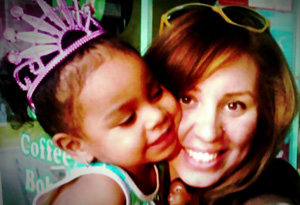
When she returned home from Iraq, Mickiela got pregnant. She didn't have anyone to care for her daughter during future deployments, so Mickiela was released from the military. Without a job, money or childcare, she found herself homeless. "I was in the military for seven and a half years, and I feel like I have nothing to show for it," she says. "I know that I don't deserve this."
Mickiela and her daughter eventually found temporary, transitional housing provided by U.S. VETS, a nonprofit organization.
When times are tough, Mickiela says her faith helps her get by. "I deal with it a day at a time, and I know that right now this is something that I'm going through, but it's not permanent," she says.
Mickiela and her daughter eventually found temporary, transitional housing provided by U.S. VETS, a nonprofit organization.
When times are tough, Mickiela says her faith helps her get by. "I deal with it a day at a time, and I know that right now this is something that I'm going through, but it's not permanent," she says.
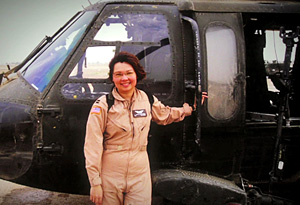
Dealing with painful physical injuries is another struggle some female soldiers face, and Maj. Tammy Duckworth is a prime example. In 2004, Tammy was piloting an Army Blackhawk helicopter just north of Baghdad when it was hit by a rocket-propelled grenade. "It had exploded right against the aircraft, and it vaporized my right leg, amputated my left and blew off most of my right arm," Tammy says.
Tammy barely survived the attack and was sent home to start the long recovery process. Back on American soil, Tammy learned to walk on her prosthetic legs and became a high-profile
advocate for veterans. She also received the Purple Heart for her service. "I should have died that day in Iraq," she says. "I don't know how I survived. I feel that this time in my life is bonus time. I've been given this great gift."
Why Tammy fights for veterans
In 2009, President Barack Obama appointed Tammy to assistant secretary of Veterans Affairs, the government agency that provides services for veterans. Tammy says she's made it her mission to improve the system for both men and women. "I feel very fortunate to be in a position where I can help make changes happen," she says. "I see it as a real privilege."
Tammy barely survived the attack and was sent home to start the long recovery process. Back on American soil, Tammy learned to walk on her prosthetic legs and became a high-profile
advocate for veterans. She also received the Purple Heart for her service. "I should have died that day in Iraq," she says. "I don't know how I survived. I feel that this time in my life is bonus time. I've been given this great gift."
Why Tammy fights for veterans
In 2009, President Barack Obama appointed Tammy to assistant secretary of Veterans Affairs, the government agency that provides services for veterans. Tammy says she's made it her mission to improve the system for both men and women. "I feel very fortunate to be in a position where I can help make changes happen," she says. "I see it as a real privilege."
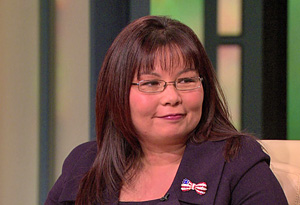
Tammy's now focusing much of her efforts on fighting homelessness among veterans. "It's too many woman," she says. "So many things have failed to end up with them being homeless. It means that they've not been able to get a job. They have not been able to get affordable housing, and perhaps, there's medical care issues that are not being met. And [Veteran Affairs] is working as hard as we can to catch up."
Tammy says President Obama has committed a tremendous amount of resources to these efforts in the past 18 months. "He wants to end homelessness among veterans in five years, and we're going to make sure that happens," she says. "[Female veterans] have strength. They have leadership training. They've defended this country. They deserve better."
Alicia says her pride makes it difficult to ask for help. "I have such pride in my uniform and such pride for my military service, and everybody is so proud of our veterans," she says.
Tammy says this is the challenge the VA is facing. "The resources are there, but if [Alicia] doesn't know about it ... she cannot access it," Tammy says. "Then, to her, those resources don't exist."
Tammy says President Obama has committed a tremendous amount of resources to these efforts in the past 18 months. "He wants to end homelessness among veterans in five years, and we're going to make sure that happens," she says. "[Female veterans] have strength. They have leadership training. They've defended this country. They deserve better."
Alicia says her pride makes it difficult to ask for help. "I have such pride in my uniform and such pride for my military service, and everybody is so proud of our veterans," she says.
Tammy says this is the challenge the VA is facing. "The resources are there, but if [Alicia] doesn't know about it ... she cannot access it," Tammy says. "Then, to her, those resources don't exist."
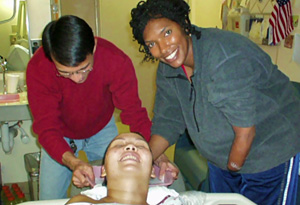
Tammy isn't the only female soldier speaking up for her fellow veterans. Sgt. 1st Class Juanita Wilson was the first American mother to lose a limb in Iraq. Oprah first met Juanita in 2009 when she visited Walter Reed Army Medical Center in Washington, D.C. What Oprah didn't know was that Juanita and Tammy share a connection.
After her Blackhawk helicopter was shot down in Iraq, Tammy was also taken to Walter Reed. "For five days, I was in searing, unrelenting, endless pain that just would not stop," Tammy says. "I was sure that I wasn't going to make it. All I could do was just lay there and look at this clock, and I just kept thinking, 'I can make it 60 seconds.'"
While Tammy was in recovery, Juanita, a fellow amputee, came to visit her and removed her own prosthetic arm. "She said, 'I know you're in pain,'" Tammy says. "'You're going to make it.' She said, 'Can I stand here for you?'"
Juanita stood by Tammy's side for five days, and helped wash the dust, sand and dried blood from Tammy's hair. "She just radiated this peace, this serenity that came out of her," Tammy says. "I hung onto that like it was a lifeline. Every so often I'd turn back, and she'd still be there."
After her Blackhawk helicopter was shot down in Iraq, Tammy was also taken to Walter Reed. "For five days, I was in searing, unrelenting, endless pain that just would not stop," Tammy says. "I was sure that I wasn't going to make it. All I could do was just lay there and look at this clock, and I just kept thinking, 'I can make it 60 seconds.'"
While Tammy was in recovery, Juanita, a fellow amputee, came to visit her and removed her own prosthetic arm. "She said, 'I know you're in pain,'" Tammy says. "'You're going to make it.' She said, 'Can I stand here for you?'"
Juanita stood by Tammy's side for five days, and helped wash the dust, sand and dried blood from Tammy's hair. "She just radiated this peace, this serenity that came out of her," Tammy says. "I hung onto that like it was a lifeline. Every so often I'd turn back, and she'd still be there."
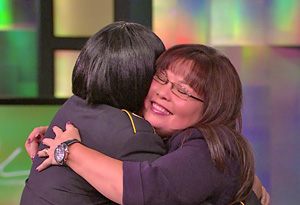
To Tammy's surprise, Juanita walks onto Oprah's stage and stands by her side once again. "When I think of this lady, I think of two words: warrior and compassion," she says. "She did for me what no one else could. It took another sister soldier to do it."
Watch Tammy and Juanita reunite.
Juanita says she didn't realize her actions had such a profound effect on Tammy. "I vowed that while I was there, whatever female came through—especially when I found out the condition that Tammy was in—it was my duty to be there, to let her know that she could make it," Juanita says.
Oprah says she'll never forget the words Juanita said the first time they spoke. "You said when you come back [from deployment], everybody expects you to be the same person you were, and there is no way you can humanly possibly be the same person you were after going into war," Oprah says. "That impacted me so much."
Juanita still feels the same way. "I don't think people have adjusted to me," she says. "I think I've adjusted to people."
Watch Tammy and Juanita reunite.
Juanita says she didn't realize her actions had such a profound effect on Tammy. "I vowed that while I was there, whatever female came through—especially when I found out the condition that Tammy was in—it was my duty to be there, to let her know that she could make it," Juanita says.
Oprah says she'll never forget the words Juanita said the first time they spoke. "You said when you come back [from deployment], everybody expects you to be the same person you were, and there is no way you can humanly possibly be the same person you were after going into war," Oprah says. "That impacted me so much."
Juanita still feels the same way. "I don't think people have adjusted to me," she says. "I think I've adjusted to people."
Please note that Harpo Productions, Inc., OWN: Oprah Winfrey Network, Discovery Communications LLC and their affiliated companies and entities have no affiliation with and do not endorse those entities or websites referenced above, which are provided solely as a courtesy. Please conduct your own independent investigation (including an investigation as to whether any contributions are tax deductible) before donating to any charity, project or organization. This information is provided for your reference only.



